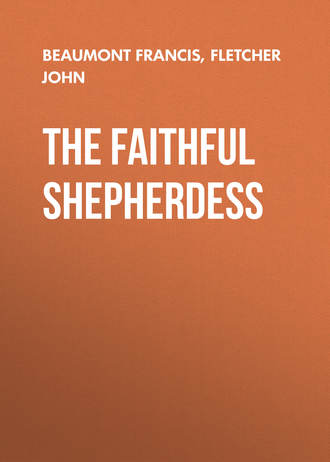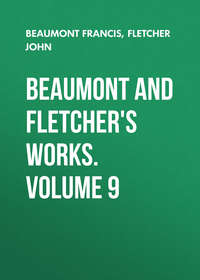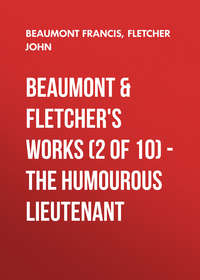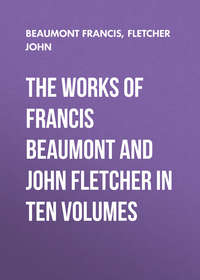 полная версия
полная версияThe Faithful Shepherdess
Satyr. Thou divinest, fairest, brightest,Thou m[o]st powerful Maid, and whitest,Thou most vertuous and most blessed,Eyes of stars, and golden tressedLike Apollo, tell me sweetestWhat new service now is meetestFor the Satyr? shall I strayIn the middle Air, and stayThe sayling Rack, or nimbly takeHold by the Moon, and gently makeSute to the pale Queen of nightFor a beam to give thee light?Shall I dive into the Sea,And bring thee Coral, making wayThrough the rising waves that fallIn snowie fleeces; dearest, shallI catch the wanton Fawns, or Flyes,Whose woven wings the Summer dyesOf many colours? get thee fruit?Or steal from Heaven old Orpheus Lute?All these I'le venture for, and more,To do her service all these woods adore.Clor. No other service, Satyr, but thy watchAbout these thickets, lest harmless people catchMischief or sad mischance.Satyr. Holy Virgin, I will danceRound about these woods as quickAs the breaking light, and prickDown the Lawns, and down the vailsFaster than the Wind-mill sails.So I take my leave, and prayAll the comforts of the day,Such as Phoebus heat doth sendOn the earth, may still befriendThee, and this arbour.Clo. And to thee, All thy Masters love be free. [Exeunt.
To my Friend Master JOHN FLETCHER upon his Faithfull Shepherdess.
I know too well, that, no more than the manThat travels through the burning Desarts, canWhen he is beaten with the raging Sun,Half smothered in the dust, have power to runFrom a cool River, which himself doth find,E're he be slacked; no more can he whose mindJoyes in the Muses, hold from that delight,When nature, and his full thoughts bid him write:Yet wish I those whom I for friends have known,To sing their thoughts to no ears but their own.Why should the man, whose wit ne'r had a stain,Upon the publick Stage present his [vein,]And make a thousand men in judgment sit,To call in question his undoubted wit,Scarce two of which can understand the lawsWhich they should judge by, nor the parties cause?Among the rout there is not one that hathIn his own censure an explicite faith;One company knowing they judgement lack,Ground their belief on the next man in black:Others, on him that makes signs, and is mute,Some like as he does in the fairest sute,He as his Mistress doth, and she by chance:Nor want there those, who as the Boy doth danceBetween the Acts, will censure the whole Play;Some if the Wax-lights be not new that day;But multitudes there are whose judgement goesHeadlong according to the Actors cloathes.For this, these publick things and I, agreeSo ill, that but to do a right for thee,I had not been perswaded to have hurl'dThese few, ill spoken lines, into the world,Both to be read, and censur'd of, by those,Whose very reading makes Verse senseless Prose:Such as must spend above an hour, to spellA Challenge on a Past, to know it well:But since it was thy hap to throw awayMuch wit, for which the people did not pay,Because they saw it not, I not dislikeThis second publication, which may strikeTheir consciences, to see the thing they scorn'd,To be with so much wit and Art adorned.Besides one vantage more in this I see,Tour censurers now must have the qualitieOf reading, which I am afraid is moreThan half your shrewdest Judges had before.Fr. Beaumont.To the worthy Author M'r. Jo. FLETCHER.
The wise, and many headed Bench, that sits Upon the Life, and Death of Playes, and Wits, (Composed of Gamester, Captain, Knight, Knight's man, Lady, or Pusill, that wears mask or fan, Velvet, or Taffata cap, rank'd in the dark With the shops Foreman, or some such brave spark, That may judge for his six-pence_) had, before They saw it half, damn'd thy whole Play, and more, Their motives were, since it had not to doe With vices, which they look'd for, and came to.
I, that am glad, thy Innocence was thy Guilt,And wish that all the_ Muses blood were spiltIn such a Martyrdome, to vex their eyes,Do crown thy murdred Poeme: which shall riseA glorified work to Time, when Fire,Or mothes shall eat, what all these Fools admire.BEN. JONSON.
This Dialogue newly added, was spoken by way of Prologue to both their Majesties, at the first acting of this Pastoral at Somerset-house on Twelfth-night, 1633.
Priest.A broiling Lamb on Pans chief Altar lies,My Wreath, my Censor, Virge, and Incense by:But I delayed the pretious Sacrifice,To shew thee here, a Gentle Deity.Nymph.Nor was I to thy sacred Summons slow,Hither I came as swift as th' Eagles wing,Or threatning shaft from vext Dianaes bow,To see this Islands God; the worlds best King.Priest.Bless then that Queen, that doth his eyes invite And ears, t'obey her Scepter, half this night.Nymph.Let's sing such welcomes, as shall makeHer sway Seem easie to Him, though it last till day.Welcom as Peace t'unwalled Cities, whenFamine and Sword leave them more graves than men.As Spring to Birds, or Noon-dayes Sun to th' oldPoor mountain Muscovite congeal'd with cold.As Shore toth' Pilot in a safe known CoastWhen's Card is broken and his Rudder lost.APPENDIX
p. 369, l. 2. C] Antiochus l. 10. C omits] have. l. 12. C _omits] Princes. B _misprints] Prnices. l. 17. C gives this line to Sel. l. 35. A] Cel. l. 40. C] I once more next [instead of beg it thus].p. 370, l. 9. C] sound. l. 10. C] beat through. l. 16. C adds] Finis. C _omits] Prologue and Epilogue.p. 371, l. 1. A] And those. l. 6. A omits] Spoke by the Lieutenant.THE FAITHFUL SHEPHERDESS
(A) The | Faithfull | Shepheardesse. By John Fletcher. | Printed at London for R. Bonian | and H. Walley, and are to be sold at | the spred Eagle over against the | great North dore of S. Paules. Undated, but probably 1609-10.
(B) The same, with slight differences in the Commendatory Verses and in one or two other sheets.
(C) The | Faithfull | Shepheardesse. | By John Fletcher. | The second Edition, newly corrected. London, | Printed by T.C. for Richard Meighen, in St Dunstanes Church-yard in Fleet-streete, | 1629.
(D) The | Faithfull | Shepherdesse. | acted at Somerset | House before the King and | Queene on Twelfe night | last, 1633. | And divers times since with great applause at the Private House in Blacke-Friers, by his Majesties Servants. | Written by John Fletcher. | The third Edition, with Addition. | London, | Printed by A.M. for Richard Meighen, next | to the Middle Temple in Fleet- street. 1634.
(E) The | Faithfull | Shepherdesse. | Acted at Somerset | House, before the King and | Queen on Twelf night | last, 1633. | And divers times since, with great applause, at the Private House in Black-| Friers, by his Majesties Servants. | Written by John Fletcher. | The Fourth Edition. | London, Printed for Ga. Bedell and Tho. Collins, at the Middle | Temple Gate in Fleet-street. 1656.
(F) The | Faithfull | Shepherdesse. | Acted at | Somerset-House, | Before the King and Queen on Twelfth Night, 1633. | And divers times since, with great | Applause, at the Private House in | Black-Friers, by his Majesties | Servants. | Written by John Fletcher. | The Fifth Edition. | London, | Printed for G. Bedell and T. Collins, at the Middle | Temple-Gate in Fleet-street, 1665.
The verso of the title-page bears the date March 3, 166-4/5.
Licensed,
Roger L'Estrange.
As neither the Second Folio nor the Quartos print any list of the Characters it may be as well to give one here.
Perigot. Old Shepherd.
Thenot Priest of Pan.
Daphnis. God of the River.
Alexis. Satyr.
Sullen Shepherd. Shepherds.
Clorin. Cloe.
Amoret. Shepherdesses.
Amarillis.
Scene: Thessaly.
The following Dedicatory Verses were omitted from the Second Folio.
To my lov'd friend M. John Fletcher, on his Pastorall.Can my approovement (Sir) be worth your thankes?Whose unkn[o]wne name and muse (in swathing clowtes)Is not yet growne to strength, among these rankesTo have a roome and beare off the sharpe flowtesOf this our pregnant age, that does despiseAll innocent verse, that lets alone her vice.But I must Justifie what privately,I censurd to you: my ambition is(Even by my hopes and love to Poesie)To live to perfect such a worke, as this,Clad in such elegant proprietieOf words, including a mortallitie.So sweete and profitable, though each man that heares,(And learning has enough to clap and hisse)Arives not too't, so misty it appeares;And to their fi1med reasons, so amisse:But let Art looke in truth, she like a mirror,Reflects [Reflect, C, D] her comfort [consort, D—F], ignorances terror.Sits in her owne brow, being made afraid,Of her unnaturall complexion,As ougly women (when they are araidBy glasses) loath their true reflection,Then how can such opinions injure thee,That tremble, at their owne deformitie?Opinion, that great foole, makes fooles of all,And (once) I feard her till I met a mindeWhose grave instructions philosophical),Toss'd it [is, F] like dust upon a march strong winde,He shall for ever my example be,And his embraced doctrine grow in me.His soule (and such commend this) that commaund [commands, D, E, F]Such art, it should me better satisfie,Then if the monster clapt his thousand hands,And drownd the sceane with his confused cry;And if doubts rise, loe their owne names to cleare 'emWhilst I am happy but to stand so neere 'em.N. F.
These verses are in A, B, C, D, E and F. In A and B they are signed 'N. F.,' in C-F they are signed 'Nath. Field.' The above text is that of A.
To his loving friend M. Jo. Fletcher concerning his Pastorall, being both a Poeme and a play: [concerning…play omitted in D, E, F]
There are no suerties (good friend) will be takenFor workes that vulgar-good-name hath forsaken:A Poeme and a play too! why tis likeA scholler that's a Poet: their names strikeTheir pestilence inward, when they take the aire;And kill out right: one cannot both fates beare.But, as a Poet thats no scholler, makesVulgarity his whiffler, and so takeswith ease, & state through both sides preaseOf Pageant seers: or as schollers pleaseThat are no Poets; more then Poets learnd;Since their art solely, is by soules discerned;The others fals [fall, D, E, F] within the common senceAnd sheds (like common light) her influence:So, were your play no Poeme, but a thingThat every Cobler to his patch might sing:A rout of nifles (like the multitude)With no one limme [limbe, E, F] of any art indude:Like would to like, and praise you: but because,Your poeme onely hath by us applause,Renews the golden world; and holds through allThe holy lawes of homely pastorall;Where flowers, and founts, and Nimphs, & semi-Gods,And all the Graces finde their old abods:Where forrests flourish but in endlesse verse;And meddowes, nothing fit for purchasers:This Iron age that eates it selfe, will neverBite at your golden world; that others, everLov'd as it selfe: then like your Booke do youLive in ould peace: and that for praise allow.G. Chapman
These lines are in A, C, D, E and F. The text is that of A.
To that noble and true lover of learning, Sir Walter Aston Knight of the Balls.
Sir I must aske your patience, and be trew.This play was never liked, unlesse by fewThat brought their judgements with um, for of lateFirst the infection, then the common prateOf common people, have such customes gotEither to silence plaies, or like them not.Under the last of which this interlude,Had falne for ever prest downe by the rudeThat like a torrent which the moist south feedes,Drowne's both before him the ripe corne and weedes.Had not the saving sence of better menRedeem'd it from corruption: (deere Sir then)Among the better soules, be you the bestIn whome, as in a Center I take rest,And propper being: from whose equall eyeAnd judgement, nothing growes but puritie:(Nor do I flatter) for by all those dead,Great in the muses, by Apolloes head,He that ads any thing to you; tis doneLike his that lights a candle to the sunne:Then be as you were ever, your selfe stillMoved by your judement, not by love, or willAnd when I sing againe as who can tellMy next devotion to that holy well,Your goodnesse to the muses shall be all,Able to make a worke Heroyicall.Given to your service John Fletcher.
These lines are in A and B.
To the inheritour of all worthines, Sir William Scipwith. Ode.
If from servile hope or love, I may proveBut so happy to be thought forSuch a one whose greatest ease Is to please(Worthy sir) I have all I sought for,For no ich of greater name, which some clameBy their verses do I show itTo the world; nor to protest Tis the bestThese are leane faults in a poetNor to make it serve to feed at my needeNor to gaine acquaintance by itNor to ravish kinde Atturnies, in their journies.Nor to read it after dietFarre from me are all these Ames Fittest framesTo build weakenesse on and pittyOnely to your selfe, and such whose true touchMakes all good; let me seeme witty.The Admirer of your vertues, John Fletcher.
These verses are in A and B.
To the perfect gentleman Sir Robert Townesend.
If the greatest faults may cravePardon where contrition is(Noble Sir) I needes must haveA long one; for a long amisseIf you aske me (how is this)Upon my faith Ile tell you frankely,You love above my meanes to thanke yee.Yet according to my TalentAs sowre fortune loves to use meA poore Shepheard I have sent,In home-spun gray for to excuse me.And may all my hopes refuse me:But when better comes ashore,You shall have better, newer, more.Til when, like our desperate debters,Or our three pild sweete protestersI must please you in bare lettersAnd so pay my debts; like jesters,Yet I oft have seene good feasters,Onely for to please the pallet,Leave great meat and chuse a sallet.All yours John Fletcher:
These lines are in A and B.
To the Reader.
If you be not reasonably assurde of your knowledge in this kinde of Poeme, lay downe the booke or read this, which I would wish had bene the prologue. It is a pastorall Tragic-comedie, which the people seeing when it was plaid, having ever had a singuler guift in defining, concluded to be a play of contry hired Shepheards, in gray cloakes, with curtaild dogs in strings, sometimes laughing together, and sometimes killing one another: And misling whitsun ales, creame, wasiel & morris-dances, began to be angry. In their error I would not have you fall, least you incurre their censure. Understand therefore a pastorall to be a representation of shepheards and shephearddesses, with their actions and passions, which must be such as may agree with their natures at least not exceeding former fictions, & vulgar traditions: they are not to be adorn'd with any art, but such improper ones as nature is said to bestow, as singing and Poetry, or such as experience may teach them, as the vertues of hearbs, & fountaines: the ordinary course of the Sun, moone, and starres, and such like. But you are ever to remember Shepherds to be such, as all the ancient Poets and moderne of understanding have receaved them: that is, the owners of flockes and not hyerlings. A tragie-comedie is not so called in respect of mirth and killing, but in respect it wants deaths, which is inough to make it no tragedie, yet brings some neere it, which is inough to make it no comedie: which must be a representation of familiar people, with such kinde of trouble as no life be questiond, so that a God is as lawfull in this as in a tragedie, and meane people as in a comedie. This much I hope will serve to justifie my Poeme, and make you understand it, to teach you more for nothing, I do not know that I am in conscience bound.
John Fletcher.
This address is in A and B.
Unto his worthy friend Mr Joseph Taylor upon his presentment of the Faithfull Sheperdesse before the King and Queene, at White-hall, on Twelfth night [F stops here] last. 1633.
When this smooth Pastorall was first brought forth,The Age twas borne in, did not know it's worth.Since by thy cost, and industry reviv'd,It hath a new fame, and new birth atchiv'd.Happy in that shee found in her distresse,A friend, as faithfull, as her Shepherdesse.For having cur'd her from her courser rents,And deckt her new with fresh habiliments,Thou brought'st her to the Court, and made [mad'st, F] her beA fitting spectacle for Majestie.So have I seene a clowded beauty drestIn a rich vesture, shine above the rest.Yet did it not receive more honour fromThe glorious pompe, then thine owne action.Expect no satisfaction for the same,Poets can render no reward but Fame.Yet this Ile prophesie, when thou shall comeInto the confines of ElysiumAmidst the Quire of Muses, and the listsOf famous Actors, and quicke Dramatists,So much admir'd for gesture, and for wit,That there on Seats of living Marble sit,The blessed Consort of that numerous Traine,Shall rise with an applause to [and, E and F] entertaineThy happy welcome, causing thee sit downe,And with a Lawrell-wreath thy temples crowne.And mean time, while this Poeme shall be read,Taylor, thy name shall be eternized.For it is just, that thou, who first did'st giveUnto this booke a life, by it shouldst live.Shack. Marmyon.
These lines are in D, E and F. The text is that of D. The variations in the dedicatory verses printed in the Second Folio will be found on p. 523.
p. 372, l. 3. A-F] Actus Primi. l. 13. A and B omit] jolly. C some copies] merry games. l. 15. A, B and D] brows be girt.
p. 373, l. 6. A and B] That I will I. l. 19. F misprints] fair heap.
P-375, l. 12. A and B] these Groves. l. 17. A and B] mires. A and B omit] to find my ruine. l. 27. A-F omit] him. l. 29. C and D] have gone this. l. 30. A-F] his rights. l. 33. 2nd Folio misprints] yours.
p. 376, l. 10. A-D] livers.
P. 377, l. 13. A and B] fall speedily. l. 14. A-D] let me goe. l. 21. A-F] seaman. l. 22. A and B] than the straightest.
p. 378, l. 19. A and B] our soules. l. 40. C] The gentle.
p. 379, l. 11. A and B] a wild. l. 18. A and B] Enter an other Shepheardesse that is in love with Perigot.
p. 381, l. 4. 2nd Folio misprints] ever. l. 11. A, B and F] their weaning. l. 18. A and B] Enter Sullen. F] Enter sullen Shepherd. l. 19. A, B and F for Shep, (character) read] Sul. l. 37. A-C omit character] Shep. D-F print] Sull.
p. 382, l. 8. A-F for Shep.] Sul. l. 25. 2nd Folio] sufficient, great to. l. 26. F] eye. l. 28. A and B] has foile enough. l. 38. A-F] dares.
p. 383, l. 5. A-D omit] likewise. C] ayre is fresh. l. 10. A-C] are grown. A-D] Woodbines. l. 26. A-D] eare of Maid. E and F] eare of maids. l. 27. C and D] I love. l. 29. A] so sure a Mold. B-F] so sure the Molde.
p. 384, l. 7. A-F] whose words. l. 13. 2nd Folio] dost,
p, 385, l. 2. A-C] hee is here.
p. 386, l. 21. A and B] grief and tine. l. 30. A-C] raine. l. 35. A-D] swains more meeter. l. 36. A and B] Than these. l. 38. A-D] Hide.
p. 387, l. 3. A-D] hath been. l. 7. F] Titans.
p. 388, l. 3. A-D] lowde falling. l. 21. A] his walkes keep. l. 32. F omits] great. l. 34. A] high birth. l. 36. A] born a most.
p. 389, l. 1. A] did lop. l. 2. A] told me. l. 6. A] teeth. l. 8. A omits] fast. l. 14. A] Formentill. l. 16. A-F] roote. A-D and F] swellings best. l. 31. A] wanton forces. l. 39. A] and with joy.
p. 390, l. 1. A] Enter Shepheard. l. 2. A] Shep. and so throughout. l. 10. A] make. l. 15. A and C] you blessed. l. 16. A] brightly. l. 19. A] That stiled is the. l. 36. A-C] into a stround.









